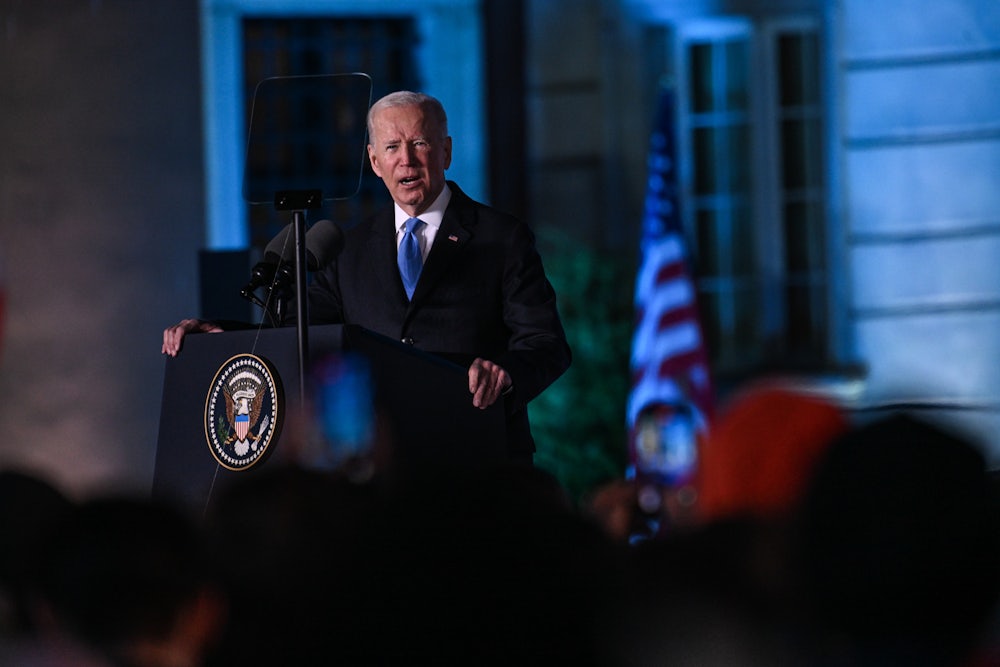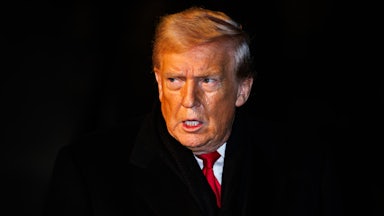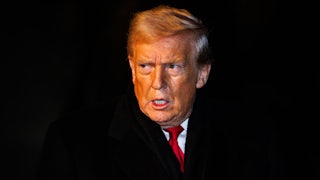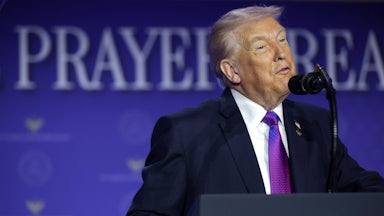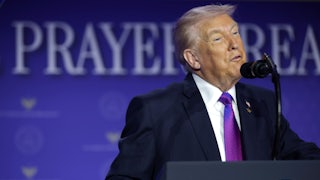The fallout from Biden’s impromptu comment in his recent Warsaw speech about Vladimir Putin having no business remaining in power has unfortunately detracted from the rest of Biden’s address. One line in particular was telling. Biden spoke about his diplomacy leading up to Russia’s invasion of Ukraine in February, saying Putin was bent on war. But then Biden added this: “I know not all of you believed me and us when we kept saying, “They are going to cross the border. They are going to attack.’”
Indeed, many people around the world were not just skeptical but critical of the claims Biden and administration officials made forecasting Putin’s attack. Russian leaders accused the United States of spreading war hysteria with its warnings. Germans and others in Europe felt it was another example of Yankees inflating threats. Anti-liberal pundits like Matt Taibbi and Glenn Greenwald said U.S. intelligence could never be trusted. Even Ukrainian President Volodymyr Zelenskiy doubted the White House’s prophecies, saying such predictions were unhelpful in a tense atmosphere.
And then Putin shocked the world by doing exactly what Biden said he would: initiating Europe’s biggest land war in 75 years. Since then, Biden has managed to skillfully unite a fractious coalition opposing Putin’s actions, successfully encourage NATO allies to finally meet their funding commitments, lead a devastating collection of sanctions against Russia, and fast-track a weapons package to Ukraine. Most importantly, he has done all this while making it clear that NATO won’t directly get involved in the war, avoiding the pressure from reckless hawks to escalate the conflict with Russia, which has the world’s largest nuclear weapons arsenal.
Biden’s reward for all this? His approval ratings on his handling of the war are plummeting, with seven in 10 Americans expressing little confidence in his ability to manage the crisis. That raises the question: Why is the public hostile to the president’s performance, which elites have generally praised as competent to excellent? The answers bode ill for the future of American foreign policy.
Russia’s attack on Ukraine followed by a matter of months the chaotic U.S. withdrawal from Afghanistan. However necessary the pullout after 20 years of failed state-building, the immediate collapse of the Afghan government to the Taliban, along with the abandonment of U.S.-friendly personnel, was bound to temporarily hamper Biden’s reputation.
But it is difficult to imagine a president handling the Ukraine crisis much better than Biden has. He has telegraphed the West’s fury at Russia while ensuring that the conflict doesn’t spill outside Ukraine. Which makes it unfortunate that most Americans believe the president has not been “tough enough” on Russia, according to one poll. Any tougher actions against Russia increase the risks of war, which many Americans also say repeatedly they want to avoid.
One elementary school teacher was quoted in reports as having representative views. First she called for stronger action: “How many years are we gonna watch this happen and then have to step in anyway? It just feels inevitable and, in the meantime, we’re just watching all these people suffer.” But then the teacher added: “More aggressive at where we are means putting troops on the ground, and I don’t necessarily know if that’s the answer either.”
The simple fact that Russia is destroying Ukraine may cause voters to blame Biden for the state of affairs, even if there are no better actions he could take in the situation. Just as voters hold presidents accountable for the state of the economy even when leaders have little sway over such matters, so they appear to be doing with foreign policy. “Americans are largely supportive of U.S. actions to date,” says Jennifer Benz, deputy director of the Associated Press-NORC Center for Public Affairs Research, which has conducted some of the polls. “About 7 in 10 overall, including majorities in both parties, approve of the economic sanctions generally and the oil ban in particular. But 56 percent feel that Biden’s response has not been tough enough, including 43 percent of Democrats and 68 percent of Republicans.”
Biden’s negative approval rating on other issues may be bleeding into perceptions of how he is handling the war. Voters blame him for inflation, which is higher than it has been in decades. Given that Americans say the cost of living is their biggest concern, with nearly 90 percent saying they are very worried about the issue, economic concerns are likely coloring their overall view of Biden. Still, Benz observes, “There is certainly general disapproval with Biden’s job performance, but the public is distinguishing to some degree between issues.” She says that approval of Biden’s handling of the economy is lower than for his handling of foreign policy or Russia.
Undoubtedly, sheer partisanship is also playing a key role. Many Republicans say they wish Biden took harsher measures against Russia—even though they adore Trump, who has actually praised Putin’s bloody invasion of Ukraine. Benz points out that “Democrats are more likely to prioritize Russian sanctions, while Republicans are more divided”—the same Republicans who accuse Biden of being weak. It’s unlikely that Republicans would praise anything Biden did to manage the situation.
This pattern of extreme partisanship suggests that a bipartisan foreign policy is simply impossible any longer. That is the claim of political scientists Peter Turbowitz and Charles Kupchan, who began arguing 15 years ago that the policy consensus that predominated during the Cold War had dissolved. “The country’s elected officials, along with the public, are backing away from the liberal internationalist compact, supporting either U.S. power or international cooperation, but rarely both,” they wrote.
The strength of the domestic political divide means that any president is going to be unable to maintain public support for a consistent, long-term foreign policy approach. That’s a problem for Biden. But it’s a bigger problem for the U.S. going forward.
